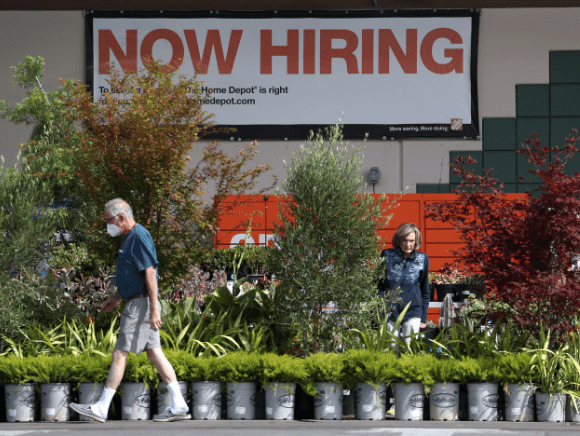Is the United States on the brink of returning to a part-time jobs economy? The jobs report confirmed that 679,000 part-time positions were added in December, according to the Bureau of Labor Statistics (BLS). This employment trend has been steadily rising since June, totaling 26.794 million. However, full-time payrolls were flat last month, coming in at 132.29 million. At the same time, the number of people working two or more jobs topped eight million, a considerable increase from November. So, what is happening? This could be the start of the next recession or, at the very least, a return to the days of former President Barack Obama.
Part-Time Jobs Economy
Part-time employment figures steadily increased in the months leading up to the 2008-2009 financial crisis. When the economic collapse slammed into the US, part-time jobs soared from about 24.75 million to nearly 27.5 million. During Obama’s time in the White House, part-time jobs remained elevated, effectively mirroring or surpassing recession levels. Excluding the COVID-19 public health crisis, they never returned to pre-2008 numbers. Even when assessing part-time jobs “for economic reasons,” they dramatically climbed during the recession and stayed there for quite some time, surging from around 4.6 million to a recession high of 9.145 million. It then peaked at 9.246 million in Sept. 2010 and would not return to pre-recession levels until May 2019.
 This matters for a few reasons. First, part-time jobs offer lower wages, maintain zero benefits and perks, and generally provide low-quality work. Second, as has been the case since the spring, they account for a considerable share of Americans working multiple positions. Third, when part-time occupations represent a notable portion of gains, it might signal weaker economic conditions since they are typically in the sustenance sector. Fourth, productivity could be another debate worth having since the total number of hours worked has been falling from its Jan. 2021 peak of 35.0 to Dec. 2022’s 34.3.
This matters for a few reasons. First, part-time jobs offer lower wages, maintain zero benefits and perks, and generally provide low-quality work. Second, as has been the case since the spring, they account for a considerable share of Americans working multiple positions. Third, when part-time occupations represent a notable portion of gains, it might signal weaker economic conditions since they are typically in the sustenance sector. Fourth, productivity could be another debate worth having since the total number of hours worked has been falling from its Jan. 2021 peak of 35.0 to Dec. 2022’s 34.3.
Team Transitory
It was only a little more than a year ago when the Federal Reserve declared it was time to retire the term “transitory” when discussing inflation. Despite all the evidence of the consumer price index (CPI) climbing higher, Fed Chair Jerome Powell and his colleagues were convinced the inflationary pressures would be temporary and mild. How wrong they were! Now that price inflation has likely peaked – money-supply growth is down, lagging indicators are falling, and demand destruction is taking hold of the national economy – some central bankers are performing an autopsy.
Minneapolis Fed Bank President Neel Kashkari recently penned an essay, admitting that “Team Transitory” was wrong. Then, of course, he had to make some excuses and explain why he was wrong. “[M]any of us—those inside the Federal Reserve and the vast majority of outside forecasters—together made the same errors in, first, being surprised when inflation surged as much as it did and, second, assuming that inflation would fall quickly,” he wrote.
But even his explanations are suspect and could be hotly debated. First, Kashkari alluded to the Philips Curve Model, an idea that suggests an economy will inevitably experience a trade-off: high unemployment and low inflation or low unemployment and high inflation. This concept has been debunked; look at the stagflation troubles of the 1970s as an example. Second, he neglected to mention the astronomical increase in the money supply at the onset of the coronavirus pandemic. Remember when he told “60 Minutes” that the Eccles Building had “an infinite amount of cash”?
 So, looking ahead, Kashkari thinks that the central bank should only start cutting once officials agree that inflation is clearly showing signs of progress. His projection involves the federal funds rate (FFR) hitting 5.4%, pausing, and then leaving it for the long run. By comparison, he previously asserted in a June 2021 interview with Reuters that rates should stay near zero through the end of 2023.
So, looking ahead, Kashkari thinks that the central bank should only start cutting once officials agree that inflation is clearly showing signs of progress. His projection involves the federal funds rate (FFR) hitting 5.4%, pausing, and then leaving it for the long run. By comparison, he previously asserted in a June 2021 interview with Reuters that rates should stay near zero through the end of 2023.
The Fall of the Bitcoin Bank
Silvergate Capital, which transformed into a cryptocurrency-focused financial institution, has suffered enormous losses. The company saw its stock crater more than 40% during the Jan. 5 session and posted another 8% drop to close out the first trading week of 2023 below $12. This was a significant selloff after it soared to above $200 per share in November 2021. Even Wall Street fund manager darling Cathie Wood liquidated nearly all her shares in the bank.
But why did this happen anyway? Former FTX CEO Sam Bankman-Fried is the fall guy.
Executives revealed that there was a run on deposits, prompting the organization to sell assets, such as securities and related derivatives, at a $718 million loss. By the end of the fourth quarter, total deposits at Silvergate cratered to $3.8 billion as clients withdrew approximately $8.1 billion of digital-asset deposits amid the chaos and panic surrounding Bankman-Fried.
“In response to the rapid changes in the digital asset industry during the fourth quarter, we took commensurate steps to ensure that we were maintaining cash liquidity in order to satisfy potential deposit outflows, and we currently maintain a cash position in excess of our digital asset related deposits,” Silvergate said in a statement.
The entity is now undergoing a quasi-restructuring, shedding the workforce by 200 positions in response to internal fiscal troubles and economic headwinds. Leaders also revealed that the company’s presence in the crypto sector could make it a takeover target by larger businesses aiming to accelerate their investment endeavors in this realm.




